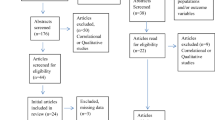Abstract
Premenstrual dysphoric disorder (PMDD) is a severe form of premenstrual syndrome (PMS) reported to affect 3–8 % of women of reproductive age and resulting in marked emotional and occupational impairment. Despite its prevalence, the etiology of PMDD is largely unknown, and patients remain mostly undiagnosed and poorly treated. It has been suggested that PMDD is a manifestation of underlying depressive disorder which is associated with the inability to regulate emotions in an adaptive manner. Therefore, we hypothesized that women with PMDD would exhibit increased difficulty with emotional regulation. A total of 648 female Israeli college students were assessed by the Premenstrual Symptoms Screening Tool (PSST) and the Difficulties in Emotion Regulation Scale (DERS). Of these women, 166 (25.6 %) met the criteria for PMS. Sixty-four (9.9 %) suffered from PMDD. More emotion regulation deficits were observed in the PMDD and PMS groups compared to the control group. Furthermore, there were more emotional regulation deficits among the predominantly psychological and mixed symptom subtype compared to the predominantly physical symptom subtype group. This is the first study to report an association between emotional dysregulation and PMDD. These findings may lead to development of more individually tailored treatment protocols focused on improving emotional regulation techniques.

Similar content being viewed by others
References
Accortt EE, Kogan AV, Allen JJ (2013) Personal history of major depression may put women at risk for premenstrual dysphoric symptomatology. J Affect Disord 150:1234–1237
American Psychiatric Association. (2013). Diagnostic and Statistical Manual of Mental Disorders (5th ed.). Washington, DC: Author.
Bardeen JR, Fergus TA, Orcutt HK (2012) An examination of the latent structure of the difficulties in emotion regulation scale. J Psychopathol Behav Assess 34:382–392
Bergman R (2010) From childhood sexual abuse to eating disorders symptoms in adulthood and the relation to emotion regulation. Unpublished master’s thesis, the Hebrew University of Jerusalem, Israel
Bentz D, Steiner M, Meinlschmidt G (2012) SIPS—screening instrument for premenstrual symptoms: the German version of premenstrual screening tool to assess clinically relevant disturbances. Nervenarzt 83:33–39
Bloch M, Schmidt PJ, Rubinow DR (1997) Premenstrual syndrome: evidence for symptom stability across cycles. Am J Psychiatr 154:1741–1746
Borenstein JE, Dean BB, Yonkers KA, Endicott J (2007) Using the daily record of severity of problems as a screening instrument for premenstrual syndrome. Obstet Gynecol 109:1068–1075
Campbell-Sills L, Barlow DH, Brown TA, Hofmann SG (2006) Acceptability and suppression of negative emotion in anxiety and mood disorders. Emotion 6:587–595
Cohen J (1988) Statistical power analysis for the behavioral sciences, 2nd edn. Erlbaum, Hillsdale, NJ
Cooper AM, Michels R (1988) Book forum: Diagnostic and Statistical Manual of Mental Disorders, 3rd ed., revised (DSM-III-R). Am J Psychiatry 145:1300–1301
Critchlow DG, Bond AJ, Wingrove J (2001) Mood disorder and personality assessment in premenstrual dysphoric disorder. J Clin Psychiatry 62:688–693
Cunningham J, Yonkers KA, O’Brien S, Eriksson E (2009) Update on research and treatment of premenstrual dysphoric disorder. Harv Rev Psychiatry 17:120–137
De Berardis D, Campanella D, Gambi F, Sepede G, Carano A, Pelusi L, Ferro FM (2005) Alexithymia and body image disturbances in women with premenstrual dysphoric disorder. J Psychosom Obstet Gynaecol 26:257–264
Dennerstein L, Lehert P, Heinemann K (2012) Epidemiology of premenstrual symptoms and disorders. Menopause Int 18:48–51
Ehring T, Tuschen-Caffier B, Schnülle J, Fischer S, Gross JJ (2010) Emotion regulation and vulnerability to depression: spontaneous versus instructed use of emotion suppression and reappraisal. Emotion 10:563–572
Endicott J (1994) Differential diagnosis and comorbidity. In: Gold JH, Severino SK (eds) Premenstrual dysphoria: women’s reality. APA Press, Washington DC
Endicott J, Amsterdam J, Eriksson E, Frank E, Freeman E, Hirschfeld R, Thys-Jacobs S (1999) Is premenstrual dysphoric disorder a distinct clinical entity? J Womens Health Gend Based Med 8:663–679
Epperson CN, Steiner M, Hartlage SA, Eriksson E, Schmidt PJ, Jones I, Yonkers KA (2012) Premenstrual dysphoric disorder: evidence for a new category for DSM-5. Am J Psychiatry 169:465–475
Frank RT (1931) The hormonal causes of premenstrual tension. Arch Neurol Psychiatr 26:1053
Freeman EW, Sammel MD, Lin H, Rickels K, Sondheimer SJ (2011) Clinical subtypes of premenstrual syndrome and responses to sertraline treatment. Obstet Gynecol 118:1293–1300
Gingnell M, Comasco E, Oreland L, Fredrikson M, Sundström-Poromaa I (2010) Neuroticism-related personality traits are related to symptom severity in patients with premenstrual dysphoric disorder and to the serotonin transporter gene-linked polymorphism 5-HTTPLPR. Arch Womens Ment Health 13:417–423
Graham CA, Sherwin BB (1992) A prospective treatment study of premenstrual symptoms using a triphasic oral contraceptive. J Psychosom Res 36:257–266
Gratz KL, Roemer L (2004) Multidimensional assessment of emotion regulation and dysregulation: development, factor structure, and initial validation of the difficulties in emotion regulation scale. J Psychopathol Behav Assess 26:41–54
Gross JJ (1998) The emerging field of emotion regulation: an integrative review. Rev Gen Psychol 2:271–299
Halbreich U (2003) The etiology, biology, and evolving pathology of premenstrual syndromes. Psychoneuroendocrinology 28:55–99
Halbreich U, Borenstein J, Pearlstein T, Kahn LS (2003) The prevalence, impairment, impact, and burden of premenstrual dysphoric disorder (PMS/PMDD). Psychoneuroendocrinology 28(3):1–23
Hall E, Steiner M (2015) Psychiatric symptoms and disorders associated with reproductive cyclicity in women: advances in screening tools. Women’s Health 11:397–415
Hong JP, Park S, Wang HR, Chang SM, Sohn JH, Jeon HJ, Cho MJ (2012) Prevalence, correlates, comorbidities, and suicidal tendencies of premenstrual dysphoric disorder in a nationwide sample of Korean women. Soc Psychiatry Psychiatr Epidemiol 47:1937–1945
Hsu SC, Liu CY, Hsiao MC (2007) A comparison of the tridimensional personality questionnaire in premenstrual dysphoric disorder and major depressive disorder. Compr Psychiatry 48:366–370
IBM Corp. (2012) IBM SPSS Statistics for Windows, Version 21.0. Armonk, IBM Corp., NY
Joffe H, Cohen LS, Harlow BL (2003) Impact of oral contraceptive pill use on premenstrual mood: predictors of improvement and deterioration. Am J Obstet Gynecol 189:1523–1530
Kadian S, O’Brien S (2012) Classification of premenstrual disorders as proposed by the International Society for Premenstrual Disorders. Menopause Int 18:43–47
Kadosh KC, Luo Q, de Burca C, Sokunbi MO, Feng J, Linden DE, Lau JY (2016) Using real-time fMRI to influence effective connectivity in the developing emotion regulation network. Neuroimage 125:616–626
Mennin DS, Holaway RM, Fresco DM, Moore MT, Heimberg RG (2007) Delineating components of emotion and its dysregulation in anxiety and mood psychopathology. Behav Ther 38:284–302
Miller A, Vo H, Huo L, Roca C, Schmidt PJ, Rubinow DR (2010) Estrogen receptor alpha (ESR-1) associations with psychological traits in women with PMDD and controls. J Psychiatr Res 44:788–794
O’Brien PMS, Bäckström T, Brown C, Dennerstein L, Endicott J, Epperson CN, Yonkers K (2011) Towards a consensus on diagnostic criteria, measurement and trial design of the premenstrual disorders: the ISPMD Montreal consensus. Arch Womens Ment Health 14:13–21
Sassoon SA, Colrain IM, Baker FC (2011) Personality disorders in women with severe premenstrual syndrome. Arch Womens Ment Health 14:257–264
Spitzer RL, Williams JBW, Kroenke K, Hornyak R, McMurray J (2000) Validity and utility of the PRIME-MD patient health questionnaire in assessment of 3000 obstetric-gynecologic patients: the PRIME-MD Patient Health Questionnaire Obstetrics-Gynecology Study. Am J Obstet Gynecol 183:759–769
Steiner M, MacDougall M, Brown E (2003) The premenstrual symptoms screening tool (PSST) for clinicians. Arch Womens Ment Health 6:203–209
Sveinsdóttir H, Bäckström T (2000) Prevalence of menstrual cycle symptom cyclicity and premenstrual dysphoric disorder in a random sample of women using and not using oral contraceptives. Acta Obstet Gynecol Scand 79:405–413
Wittchen HU, Becker E, Lieb R, Krause P (2002) Prevalence, incidence and stability of premenstrual dysphoric disorder in the community. Psychol Med 32:119–132
World Health Organization (1996) Mental, behavioral and developmental disorders. In: Tenth revision of the International Classification of Diseases (ICD-10). World Health Organization, Geneva
Author information
Authors and Affiliations
Corresponding author
Ethics declarations
The study was approved by the ethics committee of the Hadassah Medical Center, Jerusalem.
Additional information
For submission to Archives of Women’s Mental Health
After review for Archives of Women’s Mental Health
An erratum to this article is available at http://dx.doi.org/10.1007/s00737-016-0663-z.
Rights and permissions
About this article
Cite this article
Reuveni, I., Dan, R., Segman, R. et al. Emotional regulation difficulties and premenstrual symptoms among Israeli students. Arch Womens Ment Health 19, 1063–1070 (2016). https://doi.org/10.1007/s00737-016-0656-y
Received:
Accepted:
Published:
Issue Date:
DOI: https://doi.org/10.1007/s00737-016-0656-y




